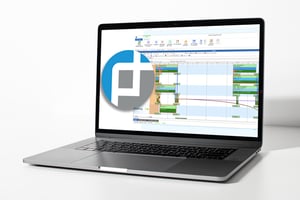Topics: Scalability, PlanetTogether Software, Data-Driven Decisions, Integrating PlanetTogether, Increased Efficiency, Real-Time Data Exchange, Enhanced Visibility, Improved Decision-Making and Agility, Optimize Resources, Chemical Manufacturing
Plant Managers are constantly seeking ways to optimize production processes, reduce costs, and enhance overall efficiency. One of the most promising solutions on the horizon is the integration of machine learning applications into predictive scheduling.
This blog will explore the transformative potential of machine learning in chemical manufacturing and the advantages of integrating scheduling software like PlanetTogether with ERP, SCM, and MES systems from industry leaders like SAP, Oracle, Microsoft, Kinaxis, Aveva, and others.

The chemical manufacturing industry has come a long way in recent years. With advancements in technology and the integration of Industry 4.0 principles, factories have become smarter, more data-driven, and more efficient. However, one of the persistent challenges has been scheduling and production planning.
Traditionally, chemical manufacturing plants relied on manual or rule-based scheduling, which often led to suboptimal production plans, longer lead times, and excessive waste. The need for a more agile and data-driven approach has driven the adoption of predictive scheduling solutions.

Machine learning is a subset of artificial intelligence (AI) that focuses on the development of algorithms and statistical models that enable computer systems to improve their performance on a specific task through learning from data. In the context of chemical manufacturing, machine learning can revolutionize scheduling by:
Machine learning algorithms can analyze vast amounts of historical production data to identify patterns and correlations that are impossible to discern manually. This helps in understanding the complex relationships between various factors influencing scheduling, such as equipment availability, raw material availability, and workforce constraints.
Predictive scheduling leverages machine learning to forecast potential disruptions or bottlenecks in the production process. By analyzing real-time data, machine learning algorithms can predict equipment failures, supply chain delays, or quality issues, allowing plant managers to proactively address these challenges.
One of the most significant advantages of machine learning in scheduling is optimization. ML algorithms can generate optimal production schedules by considering various constraints, objectives, and scenarios. This results in reduced production costs, improved resource utilization, and shorter lead times.
Machine learning models are not static; they continuously learn and adapt to changing conditions. This enables ongoing improvements in scheduling accuracy and efficiency, ensuring that the production process remains agile and responsive.
![]()

To fully harness the power of machine learning in predictive scheduling, chemical manufacturing facilities should consider integrating advanced scheduling software like PlanetTogether with their existing ERP, SCM, and MES systems. Here's how this integration can benefit Plant Managers:
Integration allows for seamless data exchange between scheduling software and ERP, SCM, and MES systems. This means that scheduling decisions can be based on up-to-the-minute information about inventory levels, production orders, and resource availability.
With access to accurate and real-time data from various systems, Plant Managers can make informed decisions regarding production scheduling. This leads to better resource allocation, reduced lead times, and increased on-time deliveries.
Integrating scheduling software with other systems automates many manual tasks and reduces the risk of data entry errors. This frees up valuable time and resources, allowing the plant to operate more efficiently.
As chemical manufacturing facilities grow and evolve, their scheduling needs change. Integration with robust software like PlanetTogether ensures scalability, accommodating increased production volumes and complexity.
Integration provides a comprehensive view of the entire production process. Plant Managers can monitor progress, identify bottlenecks, and address issues in real time, resulting in smoother operations and reduced downtime.

When considering integration with scheduling software, Plant Managers have several options. Some of the leading systems in the chemical manufacturing industry include:
SAP offers a comprehensive suite of enterprise solutions that can seamlessly integrate with scheduling software. This integration provides Plant Managers with a holistic view of their operations and enhances decision-making capabilities.
Oracle's ERP and SCM solutions are renowned for their scalability and flexibility. Integration with scheduling software allows for efficient resource allocation and improved production planning.
Microsoft Dynamics offers robust ERP and SCM solutions that can be integrated with scheduling software for enhanced visibility and agility in production scheduling.
Kinaxis is a specialized supply chain planning and optimization platform that can be integrated with scheduling software to ensure synchronized and efficient operations.
Aveva's MES solutions are designed to streamline manufacturing operations. Integration with scheduling software enhances the ability to adapt to changing demands and optimize production.
Machine learning applications in predictive scheduling represent a significant leap forward for chemical manufacturing facilities. By leveraging the power of machine learning algorithms and integrating scheduling software with ERP, SCM, and MES systems, Plant Managers can achieve unprecedented levels of efficiency, agility, and competitiveness.
The integration between scheduling software like PlanetTogether and industry-leading systems such as SAP, Oracle, Microsoft, Kinaxis, and Aveva is the key to unlocking the full potential of predictive scheduling. It empowers Plant Managers to make data-driven decisions, optimize resources, and continuously improve their production processes, ultimately ensuring long-term success in the dynamic world of chemical manufacturing.
Are you ready to take your manufacturing operations to the next level? Contact us today to learn more about how PlanetTogether and integrated scheduling solutions can help you achieve your sustainability goals and drive success in the chemical industry.
Topics: Scalability, PlanetTogether Software, Data-Driven Decisions, Integrating PlanetTogether, Increased Efficiency, Real-Time Data Exchange, Enhanced Visibility, Improved Decision-Making and Agility, Optimize Resources, Chemical Manufacturing
0 Comments
No video selected
Select a video type in the sidebar.







LEAVE A COMMENT